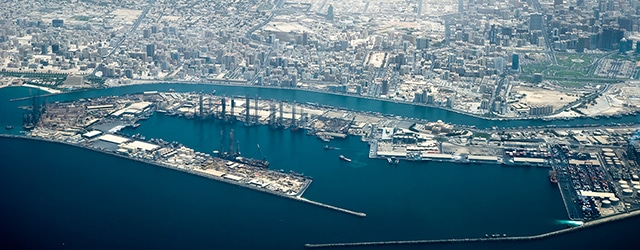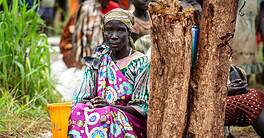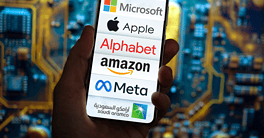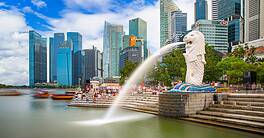Dubai is remaking itself as an infotech hub. But strong ties to the regional oil sector are keeping the economy on a roller coaster.

Dubai is the striver among the seven states that make up the United Arab Emirates. Endowed with far less oil reserves than Abu Dhabi, the dominant partner in the UAE, it has worked hard to remold itself as a major information and technology center for the Middle East.
Its strategic location and ease of doing business have attracted foreign direct investment (FDI)—to the tune of more than $10 billion in 2018, 43% above the prior year. Flows were largely in hotel and food services (46% of inflows), followed by residential and commercial real estate construction (23%), arts and recreation (5%), and finance (4%).
Yet, while finance, foreign trade, tourism and real estate are significant economic drivers, logistics and other services related to the oil industry remain critical, and Dubai depends on the continued health of the oil sector, making its recent history something of a roller coaster. Ten years ago, in the depths of the worldwide recession, Dubai had to borrow more than $20 billion from Abu Dhabi to keep its formidable collection of government-related enterprises (GREs)—including Dubai World, its global investment vehicle—afloat. The loan reassured global markets of Dubai’s viability.
In the ensuing years, however, various Dubai enterprises have needed large-scale refinancing. Currently, some economic indicators are again dropping. According to a recent report by Capital Economics, passenger traffic at Dubai International Airport has slowed since the middle of last year. Property prices in January were 9.4% lower than in January 2018 and were down a wrenching 25% from their peak, in 2014 (although the report attributes the plunge more to oversupply than to the drop in oil prices).
Dubai’s strengths have drawn attention from the West and also from Russia, according to Anna Borshchevskaya, a senior fellow at the Washington Institute for Near East Policy. Shipping access and soft power projections are key priorities for Russia, she tells Global Finance, and lucrative Dubai has become a preferred strategic platform.
Dubai’s recovery, however, will depend a good deal on the fortunes of oil. The country is still not sufficiently diversified to be insulated from oil-price gyrations, says Atif Kubursi, economics professor emeritus at McMaster University and former acting executive secretary of the UN Economic and Social Commission for Western Asia. While a 2014 debt restructuring has masked some of Dubai’s money problems in recent years, half of the debt of its GREs matures in 2021.
With these uncertainties in mind, the emirate is rethinking its economic priorities and its approach to FDI, says Raimundo Soto, associate professor of macroeconomics and econometrics at the Pontifical Catholic University of Chile and formerly director of international development at the Dubai Economic Council.
“Nothing is taken for granted,” he says. “The allocation [of funds] is far more rational than it used to be, with all these flashy investments with very little return. [Government officials] are far more concerned about the return on investments, and government enterprises are far better monitored now.”
Meanwhile, Dubai is pushing ahead with its diversification program. “They are trying to make it a knowledge hub, a high-tech hub,” says Kubursi, who has consulted for the governments of Saudi Arabia, Kuwait, Oman and the UAE. “There is no other place on the Gulf that could be as hospitable or as attractive as Dubai.”
That should mean more FDI opportunities in the information technology sector. Dubai is also aggressively investing to attract more tourists and connect with the burgeoning interest in cruise ships and hovercraft. “These two are growth segments of the tourism industry,” says Kubursi.
In the near term, Dubai expects growth will be bolstered by World Expo 2020, which it will host starting in October of next year. The Capital Economics report projects annual growth between 3.8% this year and 4.5% through April 2021, when the expo ends. However, the report cautions that preparations for the expo could create a “risk of overcapacity” in its aftermath, shrinking revenues to the GREs and jeopardizing Dubai’s ability to service its debts.
War and Other Uncertainties
Looking out a bit farther, the economy faces more uncertainties. While the likelihood of war between Iran and the US, Saudi Arabia and their allies appears remote, close observers are not ruling it out, and that might sour some prime investors.
“A large amount of money from Iranians and British Iranians went into building” Dubai, notes Mohamad Tavakoli, professor of history and Near and Middle Eastern civilizations at the University of Toronto. Should war erupt, those investments would be in jeopardy; perhaps such cross-border investment will discourage hostilities.
War would also slow down or halt the export of oil through the Strait of Hormuz, reducing demand for logistics services provided by Dubai and its strategic port. “It [would] create a crisis the authorities in Dubai would not know how to handle,” says Tavakoli.
What will it take to improve the economy’s long-term prospects and put growth on a more stable basis? Dubai will have to boost productivity, says Soto, and an improved educational system will be vital to achieving this. “The quality of the education system is mediocre at best,” he says. “If you want to have more productive workers, you [have to] improve the education system.”
While it remains vulnerable to oil-price shocks, Dubai will also have to carry out fiscal reforms, particularly in budgeting and capital expenditures. And accountability needs to be improved for the emirate’s GREs. Some, including Emirates Airlines, Emirates Global Aluminium, DP World and the Jebel Ali Free Zone have developed successful businesses, but need to mitigate risks in debt payments and improve financial transparency in order to draw more investment, Soto explains.



